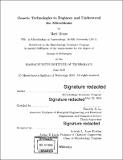| dc.contributor.advisor | Timothy K. Lu. | en_US |
| dc.contributor.author | Mimee, Mark(Mark K.) | en_US |
| dc.contributor.other | Massachusetts Institute of Technology. Department of Biology. | en_US |
| dc.date.accessioned | 2019-11-22T00:09:48Z | |
| dc.date.available | 2019-11-22T00:09:48Z | |
| dc.date.copyright | 2018 | en_US |
| dc.date.issued | 2018 | en_US |
| dc.identifier.uri | https://hdl.handle.net/1721.1/123071 | |
| dc.description | Thesis: Ph. D., Massachusetts Institute of Technology, Department of Biology, 2018 | en_US |
| dc.description | Cataloged from PDF version of thesis. | en_US |
| dc.description | Includes bibliographical references (pages 159-195). | en_US |
| dc.description.abstract | The microbes that inhabit the human body are integral to human health and disease: from inflammatory bowel disease to allergy, metabolic syndrome to autism. Due to its high connectivity with human physiology, manipulation of the microbiota has therapeutic potential in a vast array of diseases. However, techniques for targeted modification of microbial communities are currently lacking. In this thesis, I present several technologies that can be applied to engineer and better understand the microbiota. First, we present a subtractive strategy for microbiota manipulation using CRIPSR-Cas engineered bacteriophage that can selectively remove target strains from a community based on the presence of target DNA sequences. Next, we describe an additive strategy whereby commensal Bacteroides spp. are genetically modified to perform novel functions within the murine microbiota. We developed a suite of genetic parts to facilitate organism design and engineering. These tools were then expanded to engineer outer membrane vesicles derived from Bacteroides as immunomodulatory agents. Finally, we leveraged the natural sensing abilities of bacteria to create cellular biosensors for biomarkers of gastrointestinal disease. Heme biosensors were paired with readout electronics to generate an ingestible medical device for in situ detection of gastrointestinal bleeding. The technologies described herein contribute to the progression of microbiome engineering towards clinical applications and the advancement of our understanding of how our smallest friends impact our health. | en_US |
| dc.description.statementofresponsibility | by Mark Mimee. | en_US |
| dc.format.extent | 195 pages | en_US |
| dc.language.iso | eng | en_US |
| dc.publisher | Massachusetts Institute of Technology | en_US |
| dc.rights | MIT theses are protected by copyright. They may be viewed, downloaded, or printed from this source but further reproduction or distribution in any format is prohibited without written permission. | en_US |
| dc.rights.uri | http://dspace.mit.edu/handle/1721.1/7582 | en_US |
| dc.subject | Biology. | en_US |
| dc.title | Genetic technologies to engineer and understand the microbiome | en_US |
| dc.type | Thesis | en_US |
| dc.description.degree | Ph. D. | en_US |
| dc.contributor.department | Massachusetts Institute of Technology. Department of Biology | en_US |
| dc.identifier.oclc | 1127387754 | en_US |
| dc.description.collection | Ph.D. Massachusetts Institute of Technology, Department of Biology | en_US |
| dspace.imported | 2019-11-22T00:09:47Z | en_US |
| mit.thesis.degree | Doctoral | en_US |
| mit.thesis.department | Bio | en_US |
